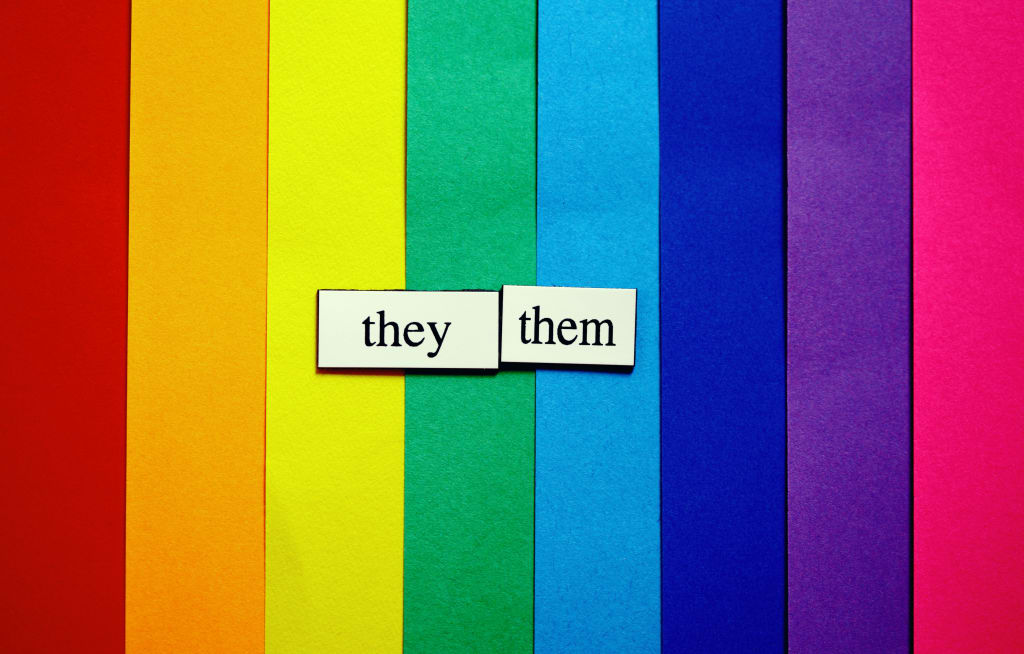You Say Sir/Mam, I Say Gender-Neutral Language
Removing gendered terms from your vocabulary could save the feelings of many in the LGBTQ community.

It is no secret that many of us were raised to use terms like sir and mam when addressing someone whom we may not know, who may be our elder, or in a professional setting.
When you try to gain the attention of someone, without the knowledge of their name, you may call them sir or mam based on their outward appearance. This may have worked in the 1950s, but in 2021, this form of outdated etiquette can be quite offensive.
Gendered manners are not polite at all.
I can’t quite remember the conversations or scenarios that led to me growing up with the inherent knowledge of using words like sir or mam as a respectful way to address individuals. These terms never caused me much thought, until they became offensive to me personally.
As a cis-gender woman who dresses in a way society tells us is more masculine, I have been called sir more times than I care to admit. By the cashier at checkout, by the coworker who hasn’t yet heard me speak, or by those in a grocery store when trying to gain my attention.
What we may fail to recognize when we use terms like sir or mam, armed only with the knowledge of physical appearance or tone of voice, is that we could be misgendering the individual. This offense is far from good manners. While misgendering is rarely intentional, it is time for us to reevaluate our speech regarding others.
Using other phrases when trying to be respectful or address someone is a way we can become more aware of speaking in a gender-neutral fashion. Instead of using sir or mam, simply saying excuse me to gain the attention of someone can suffice.
We can also begin conversations with people, like coworkers, by stating our names and pronouns. This can help normalize the usage of proper pronouns. It also provides a safe and open space for others to share their own pronouns that may fall outside of the usual he/her.
Let us dive a bit deeper into why pronouns are so important.
Proper pronoun usage begins with you.
She, he, her, and him are some of the first words we all learn as children. We use these words to describe ourselves in conversation and refer to others. These words can be found in the sentences of emails, memos, letters to friends, text messages, and our daily spoken vocabulary.
How often do we think about the fact that common pronoun usage can be offensive and cause misgendering of others though?
I use the pronouns she/her. My pronouns are always displayed in public places where I interact with others, such as my email signature. I do not share my pronouns solely so others do not misgender me in email conversations or upon seeing my outward appearance. I share them mostly to normalize the conversation around pronouns not being something we can assume.
If an individual identifies as non-binary, for example, their pronouns may consist of he, him, she, and her but also they, them, ze, and zir. If you are not familiar with the usage of pronouns aside from the typical societal norm, that is okay. What is not okay is turning a blind eye to the existence of those who use pronouns you may not be familiar with.
Misgendering is not your time to comfort yourself.
Now, no matter the amount of awareness or education we all have, it seems inevitable that we may make mistakes in the effort to use gender-neutral language or proper pronouns. In these moments, it seems the natural reaction is to profusely apologize or provide excuses for ourselves. Here are some examples of these scenarios:
- I am so, so sorry I called you that/used that term.
- How could I do that? You totally look like a (insert gendered response).
- Wow, I can’t believe I made that mistake in your name/pronouns. It is hard when you look like a ( insert gendered response).
- Oh my god, that was so wrong of me! I will never do that again, I promise.
While it is a knee-jerk reaction to apologize or make an excuse for why you have made a mistake, this is a selfish endeavor. These responses generally stem from your own discomfort with the mistake you have made. It is also common for us to make excuses when we make a mistake. This takes the blame off of us and puts some of it on the individual we may have offended.
This mistake is not a time for you to comfort yourself. Think about the way someone is feeling who has to correct your usage of pronouns or gendered vocabulary, especially if this is done in a group of individuals.
The best practice here would be to simply apologize and correct your language moving forward in the conversation. This provides a swift transition away from the sometimes awkward or uncomfortable situation that an individual might be in after making these corrections to your gendered vocabulary or misuse of their name.
Stay calm and remove gender from your vocabulary.
As we move into an era of individuals feeling more and more comfortable expressing themselves in ways that were not even legal a few decades ago it is time for us to revisit many aspects of our vocabulary. Using gendered terms in reference to people we do not even know is offensive, and far from those manners, you learned as a child.
Small steps in the right direction can help us make these more permanent changes in how we speak to others. Steps such as:
- Using gender-neutral pronouns like they/them when addressing someone whom we do not know.
- Normalizing the sharing of our own names and pronouns to provide safe spaces for others to share with us in return.
- When making a mistake, offering an apology and corrected language in the future as opposed to excuses or things that comfort us in these moments.
The LGBTQ community deserves to feel comfortable in casual, professional, and personal conversations. Whether you are part of the community or not, these small steps make a large impact on the LGBTQ community as a whole.
About the Creator
Meagon Nolasco
Mental health activist, LGBTQIA+ supporter, racial and social justice fighter-you know, normal human decency.






Comments
There are no comments for this story
Be the first to respond and start the conversation.